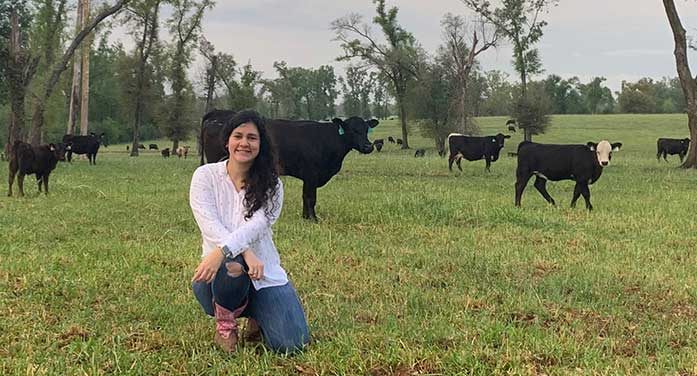Gleise M. Silva grew up in Recife, Brazil, a city perched on the turquoise edge of the Atlantic, home to lush forests, stunning beaches and 17th-century architecture. And yet, while living and studying in the “Brazilian Venice,” Silva found herself overwhelmingly drawn towards a subject she would never encounter in her hometown.
“I was 100 per cent sure I wanted to work with beef cattle. I was amazed by the animals – by the physiology,” said Silva, who started working with cattle when she travelled to the University of Florida for an undergraduate internship.
She went on to complete her PhD at UF’s North Florida Research and Education Center, specializing in beef cattle nutrition. Now, Silva’s planning her move to the Prairies, becoming the University of Alberta’s first BCRC – Hays Chair in Beef Production Systems.

As the inaugural BCRC-Hays Chair in Beef Production Systems, Gleise M. Silva will work with beef producers to find ways for them to save money, maintain forage lands and advance the Canadian beef industry’s leadership in sustainable production. (Photo: Supplied)
In her role as chair, Silva will work with beef producers, translating her and her colleagues’ research on cow-calf production into practical advice. Her work will help producers save money, maintain forage lands and advance the Canadian beef industry’s leadership in sustainable production. The position, beginning July 1, is funded by the Beef Cattle Research Council (BCRC) and the Hays family, with additional support from McDonald’s Restaurants of Canada and Cargill.
“[Producers] are the ones working hard for us from Monday to Sunday. So I want to help them get the most out of their production systems. I want my research to actually reach the people who need it the most,” she said.
This work won’t be new to Silva, whose PhD focused on environmental and diet-induced stress in cattle and on potential solutions to make cattle healthier and more efficient for the producer.
At the U of A, Silva will explore ways to responsibly produce the best beef cattle and protect grasslands – all with the goal of advancing the economic, environmental and social sustainability of Canadian beef. For example, one area she will focus on is how to reduce the cost of feeding beef cattle during long Canadian winters.
Silva’s chair position was supported by BCRC, a national, industry-led agency that invests funds from Canadian beef producers into relevant research on beef, cattle and forage. BCRC is directed by a committee of beef producers and is one of the main donors to the new chair.
“Dr. Silva is genuinely interested in engaging with producers to learn more about Canada’s beef sectors and production practices,” said Craig Lehr, BCRC vice-chair and a producer from Medicine Hat, Alta. “The council is excited about the collaboration between the university and Canada’s beef industry in filling this critical gap in Canadian research capacity.”
“The U of A is a leader in both beef genomics and rangeland research. This chair will complement and connect those programs to improve the whole cow-calf production system,” said Matt Bowman, BCRC chair.
Silva’s position was also supported by Kathy and Dan Hays. Dan is a U of A graduate, a former Canadian senator and the son of Harry Hays, creator of the Hays Converter beef cattle breed.
“The Hays family has a long history of pursuing improved productivity in the cattle industry and we’re excited to be looking to the future. The research coming out of this chair position will well serve our producers, Albertans and the environment,” said Dan.
The position is guaranteed for 10 years with responsibilities in teaching, research and extension and will be housed in the U of A’s Faculty of Agricultural, Life & Environmental Sciences (ALES). The chair will work with other faculty researchers and build a team of graduate students and support staff to create a powerful research group.
The Faculty of ALES is uniquely positioned to host this chair, with top research facilities like the Roy Berg Kinsella and Mattheis research ranches, noted dean Stan Blade.
“We are very grateful for the long-term vision of our partners and their choice to invest in this position at the U of A,” he said. “Now, we want to use these resources to do what we do best – create new ideas that lead to innovative, practical solutions to the most pressing issues in the industry.”
As Silva prepares to move to Edmonton, she’s already planning ways to connect with Alberta’s beef industry. She mentioned how exciting it will be to get on the phone with producers and start chatting about their goals.
“I want to be someone they can reach. It’s an exchange of knowledge. I will learn as much from them as I hope they will learn from me.”
| By Anna Holtby for Troy Media
This article was submitted by the University of Alberta’s Folio online magazine. The University of Alberta is a Troy Media Editorial Content Provider Partner.
© Troy Media
Troy Media is an editorial content provider to media outlets and its own hosted community news outlets across Canada.

